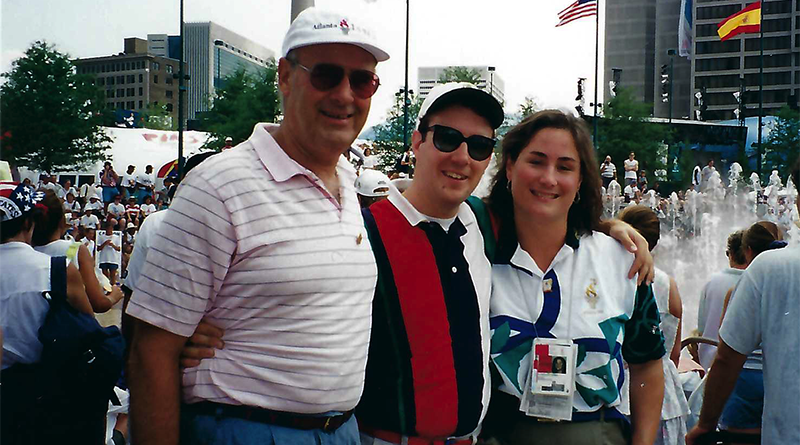With Tokyo on Horizon, UP Columnist Recalls 1996 Games
By Pressley Peters
Special Contributor
As a previous employee of the 1996 Olympic Games, I’m saddened and confused at the steps both the Japanese and the 2020 Olympic organizers are taking amid the pandemic.
Olympians and Paralympians get to compete — a positive decision — but sans spectators? Moreover, many Japanese are adding insult to injury as unwelcoming hosts (recent reporting by NPR and others show a majority don’t want the events). I say let the athletes hear fans cheering in person.

The Games have only been canceled for full-blown world war (1916, 1940, 1944). The Olympics have weathered more than a terrible virus, especially one under control in many countries that can be abated with learned procedures. Bombings, kidnappings, and terrorism are top of mind. I experienced one such disaster during the 1996 Olympic Games.
I was there in the early hours of July 27, 1996, when Eric Rudolph’s backpack bomb exploded. It’d been less than an hour since I left my shift as a media relations staffer in the “war room” of the Atlanta Committee for the Olympic Games (ACOG), and I was still in uniform.
I had moved to Georgia’s capital with starry eyes, ones that teared up at Olympic commercials. Like all Atlantans, I had waited long, planned toward the deadline, and hoped for good weather.
The air was thick that night and hotter than we’d promised for summer in the deep South. My boyfriend, now-husband Jamey, and I were listening to music in a parking lot adjacent to both the Olympic offices and press center at the Atlanta Inforum and the main stage of Centennial Park, where the bomb detonated.
It was the 100th anniversary of the Olympics. The South I loved was welcoming the world’s biggest unified celebration. Atlanta was thriving. Volunteers were showing up for their shifts. Reporters from around the world liked us, our food, and our friendly disposition. Records were being set, and the U.S was on its way to winning the most gold medals.
An enormous pop broke the sultry air, and the ground reverberated. A few people looked up for fireworks.
I sensed calamity. Bomb threats weren’t new to employees of the Olympic committee. When they happened — interrupting the workday — we didn’t know which were real and which were drills. We’d be forced to clear out of offices and wait, a frustrating experience during the all-important grind towards inaugural day: four days, three days, two days, one.
Bystanders looked around for indications of calm or panic. I grabbed Jamey and pulled him up the hill toward the committee headquarters. As we climbed, dozens of reporters — predominantly men — rushed downhill in our direction. Some wore pocketed vests; others carried heavy cameras.
I’ll never understand why the guard let Jamey into the building with me at the flash of my credentials. We rode the elevator to the top floor. I was shaking as I badged us into the low-lit conference room where people worked frantically to get information on the bombing, all eyes on the small TV sets along a single wall. The Internet was a fledgling being. TV news was king.
My sole tool was a multi-line telephone, and I dialed each person on the communications emergency list to wake them. One directed me to call CNN and tell them to stop reporting a death toll when there was no proof of one. I was so shell-shocked and green, I wouldn’t have had the wherewithal to doubt CNN or the guts to make a call warning them to verify their sources without her missive. The world’s eyes were on our Games, and I did what I was told.
A male voice from behind us announced President Clinton was on the phone. We listened as the man updated the president with what little information we had. Moments later, an Atlanta police officer and an Olympic security guard blocked our view of the monitors and instructed Jamey to leave. There was a bomb threat on our very room.
Jamey walked out unescorted, and I worried about how he’d get home. I felt safe in my spot and valuable to the media center team. I was likely neither.
In the aftermath, we learned that dozens of people were injured, and a Georgia woman had died from the explosion, along with a cameraman who’d suffered a heart attack in the race to the scene. Yet under the dark cloud of the nightmare created by an evil schemer, the athletes went on to compete the very next day. The Olympic spirit would push through.
The athletes and a global love of sport fueled us through to the closing ceremony as local and federal teams doubled down on security operations so everyone else could witness athletic feats firsthand and celebrate in person the sacrifices of the families, sponsors, reporters, and volunteers who made the Games possible. We were cheering the athletes and each other on in the face of real threat.
As we look back 25 years and watch the Tokyo Games on TV, I encourage all of us to thank behind-the-scenes staffers and fans who work to uphold Olympic ideals despite significant challenges. Like Olympians, we must keep going.
I sincerely wish the host cities health, safety, and good luck. In the same breath, I hope the leadership will change its mind about spectators. Let the Games begin with a roaring crowd!
The opinions of Pressley Peters, a freelance writer from University Park, do not represent People Newspapers. Visit pressleypeters.com.








